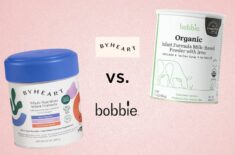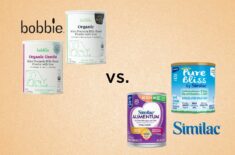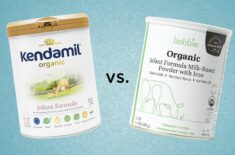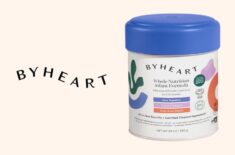Overview
Even though they’re often confused as one and the same, dairy-free and lactose-free formulas are actually quite different.
Lactose-free formulas may come from dairy sources but their lactose component is removed.
Dairy-free formulas are those that come from completely non-dairy sources, such as soy or other plants. They’re also lactose-free.
Both types of formulas may be ideal if your baby has the following:
- Colic, reflux, or gas due to food intolerances and sensitivities
- Frequent constipation or diarrhea
- Special dietary preferences (such as vegetarian, vegan, Kosher, etc.)
- Certain medical conditions (cow’s milk protein allergy, lactose intolerance, lactose sensitivity, etc.)
What Formulas Are Lactose Free?
The following are some of the best lactose-free formulas you can choose for your little one:
Best Hypoallergenic Formula with Easy-To-Digest Proteins
- Similac Alimentum – 19.8 oz
Best Soy-Based Formula with Algal Oil for DHA
Best Pea Protein Formula
- Baby’s Only Organic Pea Protein Formula – 12.7 oz
Formula Suitable for Babies with Galactosemia
Clinically Proven to Reduce Colic
- Enfamil Nutramigen – 19.8 oz
Best Hypoallergenic Amino Acid-Based Formula
- Nestlé Alfamino Infant Formula – 14.1 oz
Best Lactose-Free Formula with 2’-FL HMO Prebiotics
- Similac Pro-Sensitive – 20.1 oz
Best Non-GMO Formula with Comfort Proteins
Best Formula with MFGM (Milk Fat Globule Membrane)
- Enfamil Gentlease NeuroPro Baby Formula – 19.5 oz
Lactose-Free Vs. Dairy-Free Baby Formulas: What Baby Formula Is Good For Lactose Intolerance?
Lactose-Free Formulas
- These formulas can still come from dairy sources, but they have the lactose component removed.
- Lactose is a kind of sugar that’s only found in milk (from mammals) and dairy products.
- These formulas may come from the milk of cows, goats, or other dairy sources.
- Such formulas can be suitable for babies with lactose intolerance or sensitivity. These babies often lack the enzyme lactase, which is responsible for digesting lactose.
Dairy-Free Formulas
- Dairy-free formulas are also lactose-free and can be suitable for babies with sensitive tummies.
- But the difference is that they don’t have milk components. Instead, they’re sourced from plants such as soy, nuts (such as almonds), or even pea.
- These formulas are suitable for babies with cow’s milk protein allergies.
Some babies have galactosemia and can’t digest galactose (a type of sugar and a smaller lactose component). Certain dairy-free or lactose-free formulas might not be suitable for them. (1)(2)
Always consult with your healthcare provider or pediatrician and check the label to ensure that you’re choosing the right kind of formula.
Below are some lactose-free formulas that can provide complete nutrition for your baby.
Enfamil ProSobee Soy-Based Infant Formula
Best Features & Safety
- This formula is made with soy-based proteins.
- It may help ease fussiness, bloating, and colic.
- It’s formulated for babies with lactose intolerance.
- It can be suitable for Kosher or vegetarian diets.
- It has DHA (docosahexaenoic acid, an important omega-3 fatty acid) from Crypthecodinium cohnii oil.
- It also has ARA (arachidonic acid, an omega-6 fatty acid) from Alpina oil.
- This formula can help support a healthy brain and immune system.
Ingredients
- Corn syrup solids
- Vegetable oil (palm olein, coconut, soy, and high oleic sunflower oils)
- Soy protein isolate
- Mortierella alpina oil (for ARA)
- Crypthecodinium cohnii oil (for DHA)
Nutrition Facts
Every 5 fl oz serving of this formula contains:
- Calories: 100 calories
- Total fats: 5.3 g
- Total carbohydrates: 10.6 g
- Added sugars: 0 g
- Proteins: 2.5 g
- Vitamin A: 300 IU
- Vitamin C: 12 mg
- Iron: 1.8 mg
- Calcium: 105 mg
Product Recall
- None
Pros & Cons
Pros
- This soy formula may contain the same amounts of DHA and ARA as other Enfamil formulas.
- It may be a good choice for babies with lactose intolerance.
- It can be ideal for babies following special dietary guidelines (Kosher or vegetarian diets).
Cons
- This formula may be more difficult to dissolve compared with other milk formula alternatives.
- It has corn syrup and vegetable oils.
- It contains palm olein oil.
What Customers Say
Positive Reviews
“I have four children all of my children were on the soy formula and this worked great made baby feel better!!!” – Reviewer on Enfamil’s website.
Negative Reviews
“It was great for spit up but caused my baby to be very very constipated.” – Reviewer on Enfamil’s website.
Similac Soy Isomil Infant Lactose-Free Formula
Best Features & Safety
- This formula has DHA, vitamin E, and lutein, which are components of breast milk that can help support your baby’s brain and eye development.
- It features prebiotic FOS (fructooligosaccharides) that may help improve your baby’s digestive health and support their immune system.
- It’s specially formulated for fussiness or gas in your baby.
- It can also be ideal for babies with lactose intolerance and galactosemia.
Ingredients
- Soy protein isolate
- Corn syrup solids
- High oleic safflower oil
- Sugar
- Soy oil
- Coconut oil
Nutrition Facts
Every 5 fl oz serving contains the following:
- Calories: 100 calories
- Total fats: 5.46 g
- Total carbohydrates: 10.4 g
- Proteins: 2.45 g
- Vitamin A: 300 IU
- Vitamin C: 9 mg
- Iron: 1.8 mg
- Calcium: 105 mg
Product Recall
This product was part of the massive Similac recall involving several formulas due to possible contamination with the small common beetle (larvae or full-grown adults) in September 2010. (5)
Abbott Laboratories Inc. recalled the following lots: (5)
- Similac Isomil Advance Soy Powder (23.2 oz), Lot No. 7007450820
- Similac Isomil Advance Soy with Iron Powder (12.9 oz), Lot No. 7007455964
The company clarified that the recalled powdered formulas don’t pose a serious health risk to your child. But they may cause GI (gastrointestinal) discomfort, and your child might refuse to eat because of GI irritation from the insect parts. (6)
Post-recall tests of the recalled products showed that less than 0.2% were contaminated. (6)
Pros & Cons
Pros
- This dairy-free formula is fortified with iron.
- It’s suitable for lactose intolerant babies and those with galactosemia.
Cons
- It has corn syrup and sugar.
- It had a recall in 2010 for possible contamination. (5)
What Customers Say
Positive Reviews
“I switched to this lactose free option 5 days ago and my baby has not spit up at all. She’s happier, less fussy and her bowel movements are more consistent. Great decision to switch her from cows milk.” – Reviewer on Similac’s website.
Negative Reviews
“We wanted a milk free formula for our baby who is 1 month old & we used similac soy which caused her sever constipation & gas.” – Reviewer on Similac’s website.
Enfamil Nutramigen with Enflora LGG Hypoallergenic Infant Formula




Best Features & Safety
- According to the brand’s website, this infant formula is clinically proven to reduce colic due to cow’s milk allergy in 48 hours.
- It’s a hypoallergenic formula.
- This formula has probiotic cultures LGG (Lactobacillus rhamnosus GG) or gut-friendly bacteria.
- The brand’s website also claims that this formula may help reduce the incidence of allergies (such as eczema, urticaria, rhinoconjunctivitis, and asthma) in the future.
Ingredients
- Corn syrup solids
- Vegetable oil (soy, palm olein, high oleic sunflower, or coconut oil)
- Modified casein hydrolysate
- Modified corn starch
- Mortierella alpina oil (for ARA)
- Schizochytrium sp. Oil (for DHA)
- Lactobacillus rhamnosus (probiotics)
Nutrition Facts
Each 5 fl oz serving of this formula contains:
- Calories: 100 calories
- Total fats: 5.3 g
- Total carbohydrates: 10.3 g
- Proteins: 2.8 g
- Vitamin E: 2 IU
- Iron: 1.8 mg
- Calcium: 94 mg
- Choline: 24 mg
- Iodine: 15 mcg
Product Recall
Mead Johnson Nutritionals (makers of Enfamil) recalled Nutramigen due to incorrect preparation instructions (in Spanish) in 2001. According to the advisory, these incorrect instructions may inadvertently lead to serious health issues and possible death. (7)
These are the affected lot codes of the powder infant formula (16-ounce): (7)
- BHC43
- BHC44
- BJC45
- BJC46
- BJC47
- BJC48
- BKC49
- BKC50
- BLC51
- BLC52
- BLC53
- BMC54
- BMC55
- BMC56
- BAM57
- BAM58
- BBM59
- BBM60
- BBM61
- BCM62
- BCM63
- BCM64
- BDM65
- BDM66
- BEM67
- BEM68
- BEM69
- BEM70
- BEM71
- BEM72
- BFM73
- BFM74
The following lot codes of the ready-to-use (32-ounce) bottles have been recalled: (7)
- MBM90
- MBM91
- MCM92
- MCM93
- MCM94
- MDM95
- MDM96
- MEM97
- MFM00
- MFM01
Pros & Cons
Pros
- It doesn’t have any added table sugars or sucrose.
- It doesn’t have artificial growth hormones.
Cons
- It has palm olein oil, corn syrup, and other vegetable oils.
- It had a recall due to incorrect, potentially dangerous label instructions. (7)
- It may be more expensive than most formulas.
What Customers Say
Positive Reviews
“This formula changed my baby completely from fussy to soothed when all else has failed so far. Great for his development too!” – Reviewer on Enfamil’s website.
Negative Reviews
“This product makes my baby spit up every time I feed him. I am every disappointed as I bought the 27.8 0z container.” – Reviewer on Enfamil’s website.
y 3 minutes or so), and the smell was absolutely terrible… like an adult’s!” – Reviewer on Similac’s website.
Gerber Good Start Soy Powder Infant Formula


Best Features & Safety
- This formula has a special blend of comfort proteins (partially broken-down whey proteins), prebiotics, and probiotics for better gut health.
- It can help with colic, gas, crying, fussiness, and mild spit-up.
- It has 2’-FL HMO prebiotics.
- It also has probiotic cultures (L. reuteri DSM 17938)
Ingredients
- Corn maltodextrin
- Whey protein concentrate (hydrolyzed from milk)
- Vegetable oils (palm olein, coconut, and soy, high-oleic safflower, or high-oleic sunflower)
- L. reuteri DSM 17938 probiotic cultures
- Mortierella alpina oil (ARA source)
- Crypthecodinium cohnii oil (DHA source)
Nutrition Facts
Each 5 fl oz serving of this infant formula contains:
- Calories: 100 calories
- Total fats: 5.1 g
- Total carbohydrates: 11.2 g
- Proteins: 2.2 g
- Vitamin E: 2 IU
- Iron: 1.5 mg
- Calcium: 72 mg
- Linoleic acid: 900 mg
- Choline: 24 mg
- Iodine: 12 mcg
Product Recall
- None
Pros & Cons
Pros
- It combines probiotics (L. reuteri) with prebiotics (2’-FL HMO) to help promote a better digestive system.
- It may help prevent gas, colic, and reflux.
Cons
- It tends to form lumps and may be difficult to dissolve.
- It has soy, palm olein oil, maltodextrin, vegetable oils, and milk.
What Customers Say
Positive Reviews
“He screamed for hours at a time it took 4 days for this forumula to work but Omg when it did he was like a different child.” – Reviewer on Gerber’s website.
Negative Reviews
“It constipated him super bad, made his stomach hurt to the point he would stretch until his face was bright red, and scream for hours.” – Reviewer on Gerber’s website.
Enfamil Gentlease NeuroPro Baby Formula
Best Features & Safety
- It is formulated with easy-to-digest proteins.
- It features MFGM (milk fat globule membrane), an important component in breast milk that may support cognitive development.
Ingredients
- Corn syrup solids
- Whey protein-lipid concentrate (from milk)
- Partially hydrolyzed nonfat milk
- Soy (whey protein) concentrate solids
- Vegetable oil (coconut, palm olein, soy, and high oleic sunflower oils)
- Mortierella alpina oil (ARA source)
- Schizochytrium Sp. oil (DHA source)
Nutrition Facts
Each 5 fl oz serving of this formula has the following nutrients:
- Calories: 100 calories
- Total fats: 5.3 g
- Total carbohydrates: 10.8 g
- Proteins: 2.3 g
- Vitamin E: 2 IU
- Iron: 1.8 mg
- Calcium: 82 mg
- Linoleic acid: 780 mg
- Choline: 24 mg
- Iodine: 15 mcg
Product Recall
- None
Pros
- The formula uses hydrolyzed (broken-down) proteins that may make it easier to digest.
- It features a thinner consistency that can help it dissolve easily.
Cons
- It contains palm olein oil, soy, and corn syrup.
- It can cause constipation.
What Customers Say
Positive Reviews
“After 12 different formulas this is the only one my baby can handle.” – Reviewer on Enfamil’s website.
Negative Reviews
“My baby gets fussy and cries every time I giving her a bottle. She is having lot of gaz.” – Reviewer on Amazon.
Similac Alimentum Hypoallergenic Formula


Best Features & Safety
- It’s a hypoallergenic formula with broken-down proteins, making it easier for babies with sensitive tummies or food allergies to digest.
- The formula also has shorter fats called MCTs (medium-chain triglycerides) which may be easier to absorb.
Ingredients
- Corn maltodextrin
- Casein hydrolysate derived from milk
- Sugar
- High oleic safflower oil
- Soy oil
- Medium-chain triglycerides
- Crypthecodinium cohnii oil (for DHA)
- Mortierella alpina oil (for ARA)
Nutrition Facts
Each 5 fl oz serving of this formula contains:
- Calories: 100 calories
- Total fats: 5.54 g
- Total carbohydrates: 10.2 g
- Proteins: 2.75 g
- Vitamin A: 300 IU
- Vitamin C: 9 mg
- Iron: 1.8 mg
- Calcium: 105 mg
Product Recall
- Similac Alimentum powdered formula hasn’t been recalled.
- Similac Alimentum ready-to-drink (liquid) formula was recalled in September 2006 for a manufacturing defect. A missing layer can make the formula react with air, which can gradually reduce its vitamin C content. (3)
- The recalled products are from lot 401895V with a use-by date of May 1, 2007. (3)
Pros & Cons
Pros
- This is a hypoallergenic formula.
- It doesn’t have palm olein oil, a component in formulas that can affect calcium absorption. (4)
Cons
- It has added sugars, maltodextrin, and processed oils.
- You are required to store it in cool temperatures once the container is opened.
What Customers Say
Positive Reviews
“My little girl has been drinking this formula from the day she was born, & she’ll be 9 months old tomorrow & we have never had a problem with it whatsoever!” – Reviewer on Similac’s website.
Negative Reviews
“My twin boys did not react well to this formula, it made them really uncomfortable after they had a bottle. They would turn red in the face and get mucusy.” – Reviewer on Similac’s website.
Baby’s Only Organic Pea Protein Formula


Best Features & Safety
- This toddler formula is made from non-GMO ingredients.
- It may be the only pea protein formula currently available on the market.
- It doesn’t have dairy, soy, or gluten.
- It’s a plant-based formula that may be suitable for vegetarian and kosher diets.
- It has high levels of essential fatty acids that may promote brain and eye development.
Ingredients
- Organic pea protein concentrate
- Organic brown rice syrup
- Organic high oleic oil (sunflower or safflower)
- Organic canola oil
- Organic linoleic sunflower oil
- Organic coconut oil
- Organic sunflower lecithin
Nutrition Facts
Each 4 fl oz serving of this formula contains:
- Calories: 80 calories
- Total fats: 4 g
- Total carbohydrates: 9 g
- Proteins: 2 g
- Vitamin A: 70 mcg
- Vitamin D: 1.3 mcg
- Vitamin K: 7 mcg
- Choline: 10 mg
- Vitamin E: 1.1 mg
- Iron: 1.4 mg
- Calcium: 90 mg
- Potassium: 110 mg
Product Recall
- None
Pros & Cons
Pros
- It may be ideal for babies with food allergies or intolerance to dairy, gluten, wheat, tree nut, soy, or corn proteins.
- It’s OU-certified Kosher.
- It’s a toddler formula made with ingredients that don’t have insecticides, pesticides, or weed-killer glyphosate.
- It doesn’t have neurotoxic hexane DHA, extracted using a toxic chemical that can damage the brain.
- It’s free from palm olein oil or palm oil.
- It doesn’t have glucose or corn syrups as sweeteners.
- It may be suitable as a supplement for breastfed babies and for mixing with cereals or other baby food.
Cons
- It’s only formulated for children over one year old.
- According to the brand’s website, it meets the guidelines for baby formula composition set by the U.S. Infant Formula Act and AAP (American Academy of Pediatrics). But pea protein-based formulas haven’t been approved for commercial use yet.
- It has brown rice syrup, canola oil, and other vegetable oils.
What Customers Say
Positive Reviews
“So thankful for a dairy free option other than Soy. Our little one doesn’t have anything severe, but doesn’t digest dairy well and would spit up curdled milk pretty consistently while on dairy based formula. She also has some mild reflux which this formula seems to be cutting down the spit up by at least 50%.” – Reviewer on Nature’s One.
Negative Reviews
“My baby didn’t do well he had a skin reaction.” – Reviewer on Nature’s One.
Nestle Alfamino Infant Formula
Best Features & Safety
- It’s an amino acid-based formula for babies up to 12 months of age.
- It’s a hypoallergenic formula with linoleic acid to support your baby’s healthy heart.
- It’s specially formulated for babies with multiple food allergies and malabsorptive conditions (such as problems in absorbing healthy fats).
Ingredients
- MCTs (medium chain triglycerides)
- Corn syrup solids
- Vegetable oils (high oleic sunflower, soybean, and high-2 palmitic vegetable oil)
- Potato starch
- L-arginine
- L-aspartate
- Mortierella alpina oil (source of ARA)
- Crypthecodinium cohnii oil (source of DHA)
- Choline bitartrate
Nutritional Facts
Each 5 fl oz serving of this formula contains the following:
- Calories: 100 calories
- Total fats: 5 g
- Total carbohydrates: 11 g
- Proteins: 2.8 g
- Linoleic acid: 696 mg
- Vitamin A: 315 IU
- Vitamin C: 15 mg
- Choline: 24 mg
- Iron: 1.8 mg
- Calcium: 119 mg
Product Recall
- Nestle Germany recalled one batch of this formula in December 2018 due to an incorrect formulation. The faulty formula has too much mineral content and may make your baby sick. Symptoms could include headaches, vomiting, and nausea. (8)
- Only one batch of the formula of Alfamino (14.1 oz) was recalled: batch number 80250346GA. (8)
- According to Nestle, the high-mineral products usually turn greyish or green after preparation. (8)
Pros & Cons
Pros
- It uses amino acids that may be easier to digest by sensitive tummies.
- It’s hypoallergenic and gluten-free.
Cons
- This formula contains corn syrup, and vegetable oils.
- It had a recall in 2018 because of a faulty, potentially dangerous formulation. (8)
- It usually costs more than other formulas.
What Customers Say
Positive Reviews
“My son has Biliary Atresia and he’s been using this Alfamino and Duocal (calorie booster) since he was about 4 months old. He is 11 months old now. He tolerates this a million times better than Pregestimil. He’s thriving. This is a great product!” – Reviewer on Nestle Nutrition’s website.
Negative Reviews
“This formula was much more watery then Elecare and my son projectile vomited with it. Such a disappointment.” – Reviewer on Amazon.
Similac Pro-Sensitive Infant Formula
Best Features & Safety
- It’s formulated for lactose intolerance and sensitivity.
- It contains prebiotic 2’-FL HMO (2’-fucosyllactose human milk oligosaccharide), an immune-nourishing component of breast milk.
- This non-GMO formula also features OptiGRO (Similac’s exclusive blend of lutein, DHA, and vitamin E) for your baby’s eye health and brain development.
- It has nucleotides that can help promote better metabolic functions.
Ingredients
- Corn syrup
- Milk protein isolate
- 2’-fucosyllactose
- Short-chain fructooligosaccharides
- High oleic safflower oil
- Sugar
- Soy oil
- Coconut oil
- Crypthecodinium cohnii oil (for DHA)
- Mortierella Alpina oil (for ARA)
- Lutein
- Nucleotides
- Ferrous sulfate
Nutrition Values
Each 5 fl oz serving of this formula contains the following nutrients:
- Calories: 100 calories
- Total Fats: 5.4 g
- Total Carbohydrates: 10.9 g
- Proteins: 2.1 g
- Vitamin E: 1.5 IU
- Vitamin K: 8 mcg
- Iron: 1.8 mg
- Calcium: 84 mg
- Linoleic acid: 1,000 mg
- Choline: 24 mg
- Inositol: 24 mg
Product Recall
- None
Pros
- It doesn’t use palm olein oil.
- It may be suitable for babies with sensitive tummies.
Cons
- It contains corn syrup and added sugars.
- It can cause constipation in some babies.
- It’s not suitable for babies with galactosemia.
What Customers Say
Positive Reviews
“Our baby was colicky and used to spit up frequently. But, not any more. After using Similac Pro-Sensitive, she is doing great for the past three months. She never had any problems with digestion or gas after using Pro-sensitive and we continue to use. Mixing is super easy too.” – Reviewer on Similac’s website.
Negative Reviews
“Tried this for one week. The formula was definitely NOT for my baby. This made my baby even MORE gassy and fussy. She passed gas all the time, multiple times in an hour (imagine farting ever
Summary And Recommendations
These are some of the best formulas that don’t have lactose:
- Similac Alimentum
- Enfamil ProSobee Soy-Based Infant Formula
- Baby’s Only Organic Pea Protein Formula
- Similac Soy Isomil Infant Lactose-Free Formula
- Enfamil Nutramigen
- Nestlé Alfamino Infant Formula
- Similac Pro-Sensitive
- Gerber Good Start Soy Powder Infant Formula
- Enfamil Gentlease NeuroPro Baby Formula
FAQS
Are Lactose-Free And Lactose-Reduced Formulas The Same?
Lactose-reduced or low-lactose formulas are not completely lactose-free.
Low-lactose formulas have, as the name suggests, a low lactose content. These can be suitable for colic, gas, fussiness, and spit-up. You shouldn’t give these formulas to lactose-intolerant babies.
What Are The Reasons For Choosing Lactose-Free Or Dairy-Free Formulas?
There may be different reasons why you want or need to choose special formulas for your little one. Some of these are: (2)(9)
- Colic, fussiness, reflux, and spit-up
- Frequent constipation or diarrhea
- Gas
- Special dietary preferences (such as kosher, vegetarian, vegan, etc.)
- Certain medical conditions (lactose intolerance, lactose sensitivity, cow’s milk protein allergy, galactosemia, etc.)
What Are The Signs Of A Lactose Intolerant Baby?
Some babies don’t produce enough lactase, an enzyme that breaks down lactose; this condition is called lactose intolerance. Symptoms include:
- Bloating
- Cramping
- Diarrhea or loose stools
- Gas
- Nausea
- Abdominal pain
These symptoms may appear around 30 minutes or two hours after your child ingested something with lactose, including formula, dairy, or other milk products.
Note that breast milk contains lactose. You can’t remove this sugar from your milk even if you change your diet. So, consult with your pediatrician if you believe that your breastfed baby is lactose intolerant.
What Are The Symptoms Of Galactosemia?
Galactosemia is the condition wherein a person can’t digest galactose (a type of sugar found primarily in milk and dairy products). It leads to a high level of galactose in the blood. (2)
Symptoms of this condition include: (2)
- Refusal to eat
- Spitting up
- Vomiting
- Yellowing of the skin or jaundice
- Lethargy
- Cataracts
Galactosemia is a serious condition that should be treated immediately. It can cause speech delay, tremors (involuntary muscle contractions), learning difficulties, and fine and gross motor skills problems. (2)
What Symptoms Indicate Cow’s Milk Protein Allergy?
Milk allergy is a condition wherein the immune system reacts to components in milk or dairy products. (9)
While this is often observed after drinking cow’s milk, a child with this kind of allergy may also be allergic to other dairy products, including milk from goats, sheep, buffalo, and other mammals. (9)
Symptoms can include: (9)
- Hives
- Wheezing
- Runny nose
- Watery eyes
- Itching or a tingling feeling around the lips and mouth
- Swelling of the tongue, lips, or throat
- Coughing
- Shortness of breath
- Vomiting
- Loose stools or diarrhea, which can contain blood
- Abdominal cramps
- Colic
Milk allergies can be serious. Seek immediate medical attention if your baby appears lethargic or has breathing difficulties. (9)
Is Lactose–Free Formula Easier To Digest?
These formulas may contain lactase, an enzyme that makes it easier for the body to digest lactose.
REFERENCES
(1) http://www.galactosemia.org/diet-resources
(2) https://www.childrenshospital.org/conditions-and-treatments/conditions/g/galactosemia/symptoms-and-causes
(3) https://www.aappublications.org/content/27/9/2006229
(4) https://pubmed.ncbi.nlm.nih.gov/8780336/
(5) https://buffalonews.com/news/similac-recalls-powdered-formula/article_a7d6e134-56bc-56c7-b29d-11edd4093b1e.html
(6) https://www.cleveland.com/business/2010/09/similac_recall_check_here_to_s.html
(7) https://www.nytimes.com/2001/07/10/us/national-briefing-science-and-health-recall-of-baby-formula.html
(8) https://www.reuters.com/article/us-nestle-recall-idUKKBN1O50I2
(9) https://www.mayoclinic.org/diseases-conditions/milk-allergy/symptoms-causes/syc-20375101
















